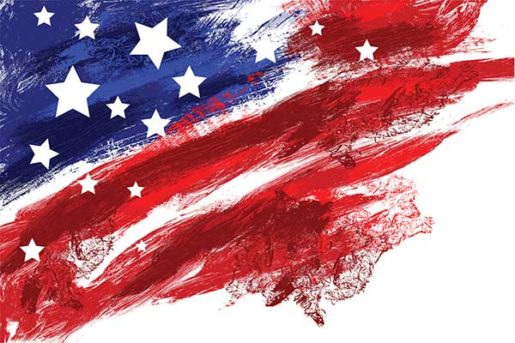
On November 3rd, American voters will be choosing between former Vice President Joe Biden and current President Donald J. Trump. Trump’s electoral victory in 2016 took many political insiders by surprise; he will be hoping to deliver a second shock to the system this year. Biden has framed his political campaign as a return to normalcy. Peyk has posed a series of questions to two guest contributors, Mr. Hossein Khorram and Mr. Shahriar Afshar, who respectively represent the Republican and Democratic parties. Peyk’s primary mission is to educate Iranian Americans on the most pressing issues facing our community and planet; as such, this article serves as a platform for two opposing points of view. The opinions expressed herein are those of the authors and do not reflect the opinions of the Peyk editorial board. Readers should also be advised that none of the facts or figures presented by the authors have been fact checked or critically contextualized by our editorial board.
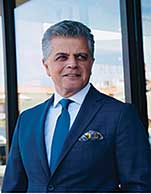
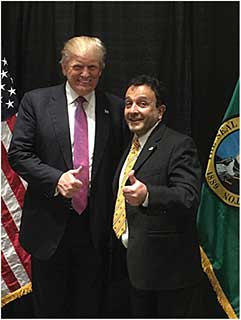
Is the United States better off today compared to 2016?
H. Khorram:
Before the COVID-19 crisis in early 2020, the United States was enjoying the results of President Trump’s America First policy with the best economy ever in U.S. history by adding 6.5 million new jobs. In 2019 alone, 2.1 million new jobs were created, 1.5 million of which employed women. Before the pandemic hit in 2020, over 492,000 manufacturing jobs and over 807,000 construction jobs had been created since the president was elected. Also, 5.6 million people had come off food stamps. In the same period, 2.4 million Americans have been lifted out of poverty, including 1.4 million American children.
The stock market has reached record highs under President Trump. Under President Trump’s leadership, Congress passed historic tax cuts and relief for hard-working Americans. The Tax Cuts and Jobs Act is the first major tax reform signed in 30 years and the largest tax reform package in history. President Trump’s America First mission has put an end to America funding and risking American lives to provide for the safety and wellbeing of other nations. The recent American pull out of the World Health Organization (WHO), in light of the Chinese government’s colossal failure under its international obligations to stop the spread and investigate the sources of COVID-19, is a clear example of President Trump protecting America’s interest.
President Trump has stood up to the Islamic Republic of Iran. He is holding Iran accountable for its utter violations of human rights and noncompliance with its obligations under the Nuclear Nonproliferation Treaty. These decisions have been held in high regard by Iranian Americans. Under President Trump’s policies, America has prospered economically to better protect America’s interests. In contrast, President Obama’s policies of overregulation and appeasing America’s enemies diminished America’s standing in the world.
S. Afshar:
No, the United States is absolutely not better off now than it was in 2016. A president’s failure of leadership is not a private event—it is a national crisis which has been highlighted by the COVID-19 pandemic and resulting historic economic collapse, recent racial tensions, and our diminished standing in the world.
Since the beginning of the pandemic in the U.S., in just 2020 alone, millions of Americans have been laid off work, bringing the total number of Americans seeking unemployment benefits to well over 32 million people. Over 100,000 small businesses—the backbone of the American economy—have closed this year and may never come back. Even giant companies that employ thousands of workers each have filed for bankruptcy, liquidated, and/or closed offices or stores, including 29 national retailers such as Neiman Marcus and J.C. Penney. Economists point to the stock market’s recovery as an indicator of economic prosperity, neglecting to mention that the federal government is funneling billions of dollars to large corporations to prop them up during the pandemic while ignoring the economic pain and suffering of average Americans.
Meanwhile, after a series of violent and visible deaths of Black citizens at the hands of police officers in various states, the U.S. has been awash in protests demanding an end to systematic racism and discriminatory police practices and seeking recognition for the Black Lives Matter movement. Rather than recognizing the pain and suffering his own citizens are experiencing, President Trump has ridiculed the movement and called it a “symbol of hate.” There is no school shooting, mall shooting, church shooting, unjust police killing of a Black person, or loss of a civil rights icon—like Congressman John Lewis—that could move President Trump to behave with humanity or compassion. He has none, unless it furthers his personal agenda, ratings, or family business.
And internationally, the United States is most certainly not in a better place than it was in 2016 after President Trump abandoned our allies and/or pulled out of multiple treaties and accords (e.g., the 1987 Intermediate-Range Nuclear Forces Treaty signed by then-President Reagan and Soviet leader Gorbachev, the 2015 Paris Climate Accord that was agreed to by more than 190 nations, the 2015 Joint Comprehensive Plan of Action [aka, Iran Nuclear Deal]) and defunded the World Health Organization in the middle of a 100-year pandemic. Instead, Trump unabashedly defends and promotes global dictators like North Korea’s Kim Jong-un, Russia’s Vladimir Putin, Turkey’s Recep Tayyip Erdogan, Saudi Arabia’s Mohammad Bin Salman (MBS), The Philippines’ Rodrigo Duterte, and the list goes on.
What flaws has COVID-19 exposed in our current economic system? In other words, in what ways could we have been better prepared to combat this pandemic given the fact that the U.S. has 4% of the world population and 25% of its cases?
H. Khorram:
America was the biggest trading partner and had the highest number of visitors from China. For that reason, it is natural that we would be most vulnerable, especially when initially China and the WHO intentionally misinformed the U.S. of the severity of COVID-19. Further, as the most democratic nation in the world, the U.S. government has to overcome our constitutional and civil liberties before enforcing social restrictions, unlike other nations. The United States Constitution does not allow the Trump administration to apply the same restrictions that most other nations exercise against their citizens.
America’s high number of cases is directly related to the immense success the U.S. has had in performing more COVID-19 tests than any other large-population country. The more testing is conducted, the more cases will be reported. Yet these people are not all being hospitalized or even showing symptoms. We have raised our children with respect and integrity while trying to preserve their individual rights and civil liberties. My wife and I are having a difficult time limiting our free-spirited, early-20s children to exercise all the COVID-19 safety requirements. It is difficult for our federal government to control the behavior of youth with respect to COVID-19, since the medical experts state that they are personally not at much risk.
S. Afshar:
So far close to 170,000 Americans have died as a result of President Trump’s mismanagement and denial of the COVID-19 pandemic, and that number may well double before the pandemic is all over. No other country has suffered as many COVID-19 deaths. Testing would have helped if it had been done early on; the U.S. insisted on developing its own test instead of leveraging the testing that had already been developed by the World Health Organization. That delay resulted in untold, unnecessary deaths at a time when our healthcare professionals were flying blind.
The United States was not unprepared for a pandemic. But President Trump was. He ignored the Obama Administration’s established pandemic response plans and proceeded to blame the same administration for not having a vaccine for a yet-undiscovered deadly virus. Then, he repeatedly and falsely claimed “Who could’ve known this would happen?” when every scientific and public health official in the world long warned that such a cataclysmic pandemic could and most likely would happen. Over the objection and instruction of his administration’s medical experts, President Trump hyped unproven treatments, including injecting known poisonous bleach as a cure, which sadly caused the deaths of some naive Americans. And he repeatedly referred to the pandemic as a “Democratic Hoax,” while refusing for months to wear or publicly recommend the use of a face mask.
Even assuming one could argue the federal government’s hands are tied when dealing with a pandemic, President Trump acted far too slowly to use the Defense Production Act—a federal law which permits the federal government to expedite and expand the supply of materials from the business/industrial sector for use in national defense and safety—to provide personal protective equipment (PPE) and ventilators to states that were begging for help. President Trump was more preoccupied with his ratings, why people don’t like him, and why the director of the National Institute of Allergy and Infectious Diseases (NIAID), Dr. Anthony Fauci, was more respected than Trump was.
Looking ahead, the next president should push Congress for a fully funded and staffed Pandemic Response Office that is not subject to the whims or deficiencies of a future president.
The rise of COVID-19 as a global pandemic has presented us with a once-in-a-lifetime opportunity to remake our economy. Why do you think your candidate is particularly equipped to be tasked with recreating the post COVID-19 economy?
H. Khorram:
America owes its prosperity to the free market system, driven by the ingenuity of the American people. By allowing markets and consumers the freedom to make the best choices, our economy has and will continue to outperform all other nations. This pandemic has accelerated our shift from a live to a digital economy, which has rewarded the technology sector. Unlike former Vice President Biden, who has no free market experience and has never had to write a single payroll check in his life, President Trump was born into a business family and has made a large fortune in the very complicated commercial real-estate market. President Trump presided over the best American economy prior to the pandemic, and he is more than capable of repeating his success. Former Vice President Biden, with no business experience, would not know how to effectively manage the largest economy in the world, much less bring it back from the impacts of the pandemic.
S. Afshar:
Unlike President Trump’s plan to misinform the American public while attacking all fact-based assessments of his poor performance, former Vice President Biden has a plan to help rebuild the economy. It’s called Build Back Better as seen here: https://joebiden.com/build-back-better/
The Biden plan will mobilize the American people in service of four bold, national efforts to address four great national challenges (pillars). As president, Biden will: (1) mobilize American manufacturing and innovation to ensure that the future is made in America, and in all of America; (2) mobilize American ingenuity to build a modern infrastructure and an equitable, clean energy future; (3) mobilize American talent and heart to build a 21st century caregiving and education workforce which will help ease the burden of care for working parents, especially women; and (4) mobilize across the board to advance racial equity in America.
As part of the Obama/Biden Administration which led the country out of the Great Recession of 2008/2009, Biden is particularly well equipped to recreate the post COVID-19 economy. The American Recovery and Reinvestment Act of 2009, signed by then-President Obama in February 2009, triggered an economic growth period which started in July 2009 and lasted for 127 months through January 2020. During that time, the economy gained a net of 11.6 million jobs, the unemployment rate dropped to below the historical norm, and the average weekly earnings for all workers was up 4.2 percent after inflation. Biden was part of the economic solution then and is best positioned to rebuild it now after historic unemployment and economic mismanagement by President Trump.
U.S. society is undergoing a reawakening regarding race relations. For instance, a recent Gallup survey shows that 65% of adults in the U.S. support the Black Lives Matter protests. Why do you think your candidate is more qualified to address the complex issue of racism in the U.S. today?
H. Khorram:
It is sad to see how Democrats and former Vice President Biden have politicized the Black Lives Matter movement. I find it incomprehensible to penalize our brave men and women in uniform, who guarantee our safety and security, for the actions of a few rogue officers. While promoting racial equality is supported, the rush into defunding our police departments all across the nation is not supported by U.S. society. Former Vice President Biden and the Democrats are accusing America of systemic racism, which does not exist. If America was a racist nation, how was a Black man elected and then reelected president? President Trump has done more to uplift the lives of minorities in our country than any president before him. He created economic opportunity zones, which mostly supported minority-owned businesses. Black and Hispanic unemployment dropped to the lowest percentage in American history under President Trump. His justice reform bill reversed the problem of mass incarceration of minorities, which was due to a 1994 crime bill authored by then-U.S. Senator Biden and signed into law by then-President Bill Clinton.
S. Afshar:
President Trump’s lifetime of divisive, racist, and incendiary words and deeds have fueled racial unrest for decades as demonstrated by just three notable examples. First, in 1989, Trump purchased full-page ads in several New York City newspapers that read, “Bring Back The Death Penalty. Bring Back Our Police!” in regard to the “Central Park Five” Black teens who had been accused of raping a white woman in New York City. He never disavowed or apologized for his racist attacks even after the accused were exonerated with DNA evidence. In 2011, Trump began appearing on talk shows urging then-President Obama to release his birth certificate and questioning if Obama was actually born in the United States. Trump cultivated this “Birther” movement, a universally agreed-to racist slander, which he later (dispassionately) disavowed in 2016. And in 2017, Trump made the unforgivable statement that “there are good people on both sides” in describing the racial unrest and peaceful protests in Charlottesville, Virginia, that resulted in the death of Heather Heyer when a white supremist drove his car into a crowd of protestors.
In contrast, former Vice President Biden not only recognizes racial inequality and inequity, he proposes investments to advance racial equity as part of our nation’s economic recovery. Under Biden’s Build Back Better plan, he plans to spur public-private investment through a new small business opportunity plan; reform minority opportunity zones to fulfill their promise; make a historic commitment to equalizing federal procurement; ensure his housing plan makes bold investments in homeownership and access to affordable housing for Black, Brown, and Native American families; achieve equity in management, training, and higher education opportunities connected to the jobs of the future; boost retirement security and financial wealth for Black, Brown, and Native American families; ensure workers of color are compensated fairly and treated with dignity; ensure equity in infrastructure and clean energy investments; support second chances for economic success; strengthen the Federal Reserve’s focus on racial economic gaps; promote diversity and accountability in leadership across key positions in all federal agencies; build a 21st century care infrastructure; and address longstanding inequities in agriculture. For more information, see: https://joebiden.com/racial-economic-equity/
5. The Pentagon’s study of climate change (2019) indicates that the climate crisis poses an existential threat to human existence if left unmitigated. How do you think the next administration should combat the climate crisis?
H. Khorram:
I agree that climate change over the long run poses a threat to the human race, as it has done in the past 10,000 years as we transitioned from the ice age, resulting in the extinction of many species and the evolution of many others. Under current climate control regulations, countries like China, which are considered developing nations, are given a free pass, while developed nations are required to adhere to stricter standards.
On August 4, 2020, the president signed a major piece of conservation legislation into law, which shows his commitment to the environment. President Trump signed the Great American Outdoors Act, which would provide $900 million annually in oil and gas revenues for the Land and Water Conservation Fund (LWCF), which helps secure land for trails and parks. The legislation would also provide billions of dollars over five years to address a maintenance backlog at national parks. The Trump administration believes in the market economy and allows free markets to identify risks and rewards while charting the best path forward. I am sure with the re-election of President Trump, we the American people will be allowed to make the best choice, protecting our future generations.
S. Afshar:
We have to rejoin the Paris Climate Accord, encourage clean energy, and de-incentivize our national reliance on fossil fuels. We also have to institutionalize our long-term commitment to dealing with climate change so it survives short-term political administrations. As former UN Secretary-General Ban Ki-moon said, “there can be no Plan B [for climate action] because there is no planet B.”
Again, former Vice President Biden has a plan. The key elements of the “Biden Plan to Build a Modern, Sustainable Infrastructure and an Equitable Clean Energy Future” include: building a modern infrastructure; positioning the U.S. auto industry to win the 21st century with technology invented in America; achieving a carbon pollution-free power sector by 2035; making dramatic investments in energy efficient buildings, including completing 4 million retrofits and building 1.5 million new affordable homes; pursuing historic investment in clean energy innovation; advancing sustainable agriculture and conservation; and securing environmental justice and equitable economic opportunity. For more information, see: https://joebiden.com/clean-energy/
6. How do you evaluate President Trump’s first term in office?
H. Khorram:
I would say President Trump’s first term was one of the major triumphs for the American people against the globalists and special interests that had been controlling our lives in many ways. From the day after inauguration, the Democratic party’s attacks against our president have been relentless and have continued to date with COVID-19 as the latest weapon of choice.
S. Afshar:
President Trump’s first term has been a national disgrace. Trump may truly have a limited capacity to understand the complexity of government administration, public policy making, and multilateral diplomacy. But the real issue is that being president is about serving others, and Trump’s self-serving instincts (to be liked/adored) will always misguide his decision-making.
7. How has the Iranian American community fared under President Trump? What do you think is at stake for our community in the upcoming election?
H. Khorram:
After the Islamic Revolution about six million Iranians left Iran with about one million settling in the United States alone. It has been very hard for we ethnic Iranians to see our mother land and its proud people ravaged daily for the past 41 years, under the cloak of Islam. It has been even more heart-breaking to see the silence of U.S. presidents and, in most cases, appeasement of the tyrants who have hijacked a proud nation. The only president who has firmly stood up against the Islamic Republic of Iran and sided with people of Iran is President Trump. I hope the Iranian American community recognizes this God-given opportunity to bring the right of self-determination to the Iranian people by helping to re-elect President Trump this fall.
S. Afshar:
Donald Trump’s presidency has been just as harmful to the Iranian American community as to any other ethnic/immigrant minority community. Even more, when it comes to Trump’s Muslim Ban and Iran sanctions, hardly any Iranian American has been spared the full force of his oppressive policies, splitting families between Iran and the United States and decimating the financial health of ordinary Iranians in Iran (on top of a poorly run national economy). Regardless of how Iranian Americans feel about the Iranian government, the U.S. foreign policy against Iran and pulling out of the Iran Deal has been a catastrophic diplomatic disaster that will only endanger the world and put U.S.-Iran peace (and our peace of mind) that much more out of reach.
8. What is the most compelling case for the election of your candidate?
H. Khorram:
Our brothers and sisters in Iran want to live free just like you and I do in the United States. I believe Patrick Henry’s quotation from March 23, 1775, when he said, “Give me liberty, or give me death!” This is what the Iranian nation wants. I feel we Iranian Americans must give our 3000-year-old mother land the gift of freedom or this proud nation’s soul may die for good. I ask you to help reelect President Trump and give a chance of freedom to Iran!
S. Afshar:
As Michelle Obama said, being president doesn’t change the man, it reveals him. President Trump has always been a transparent self-promoter but, during the past three and a half years, the presidency has revealed the indefensible depths of his depravity. Trump has dismissed any career professionals who do not sing his praises, rightly act as a check on his abuse of power, or stand up for the American people. More alarmingly, he has dismissed dozens of inspector-generals or any legally protected whistleblowers while the Senate Majority looks the other way. Trump is literally a danger to our democracy.
In contrast, former Vice President Biden has spent almost 50 years in public service and no one is elected and appointed to as many roles as he has served in without being vetted, proving his grit, demonstrating his commitment to service, and showing his ability to restore integrity to the presidency.
———————————————————————————–
Biographies:
Hossein Khorram serves as the King County Republican Party finance chair in Washington State and is the vice chair of the American Mideast Coalition for Democracy, the largest pro-Trump Middle Eastern American organization. More recently, Mr. Khorram served as chairman on the Middle Eastern American Advisory Committee of the Trump campaign in 2016. In 2011, he was appointed by the Washington State Secretary of State to represent him in Washington, D.C., in exploratory trade negotiations between Washington State and the Republic of Iraq. Since 2002, Mr. Khorram has regularly appeared as a conservative commentator on Iran on international television and radio programs and in print media, including: Voice of America, BBC Persian, Aljazeera, Seattle Times, Bellevue Reporter, NPR, Radio Free Europe, SonntagsZeitung in Switzerland, and KIRO 7 (a Seattle CBS affiliate). Mr. Khorram works as a property developer. He has been married for 27 years and has two college-age children.
Shahriar Afshar served in public service with the City and Port of San Diego for over 25 years, leading $500 million waterfront development projects. He is also the president of Iranian American Democrats of San Diego. Mr. Afshar has been a speaker at trade associations and countless civic groups, mainstream TV/print news media, and professional organizations, including visiting dignitaries and members of Congress. He was a lobbyist in Washington, D.C., and worked closely with several Fortune 100 companies to advance free trade, economic diplomacy, and engagement with companies such as Caterpillar, ExxonMobil, and General Motors. Mr. Afshar has a deep love, respect, and appreciation for advancing autism awareness, the Iranian American community, and soccer. He has lived in San Diego since 1979, attended San Diego State University, and has a BS in Finance and a Master of Public Administration.


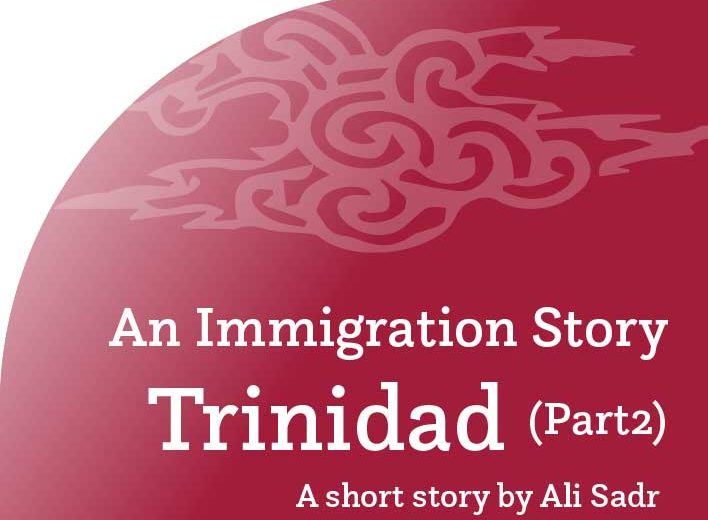
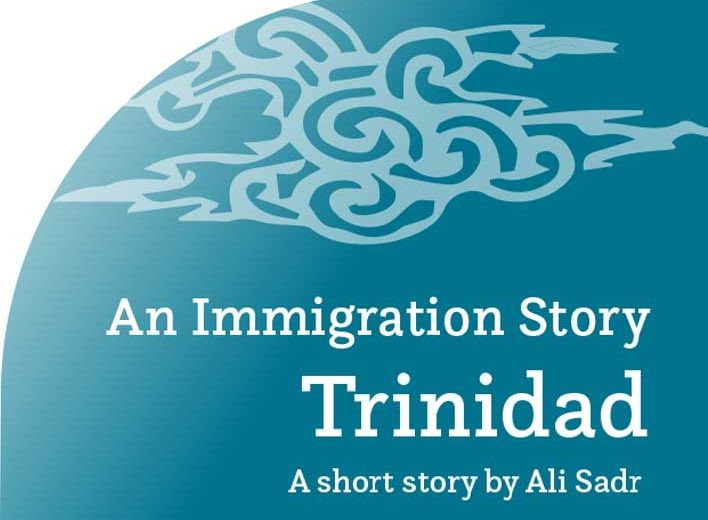
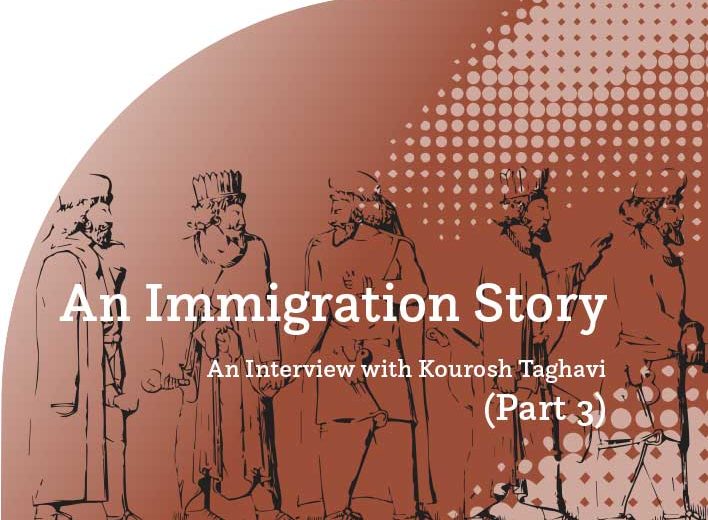

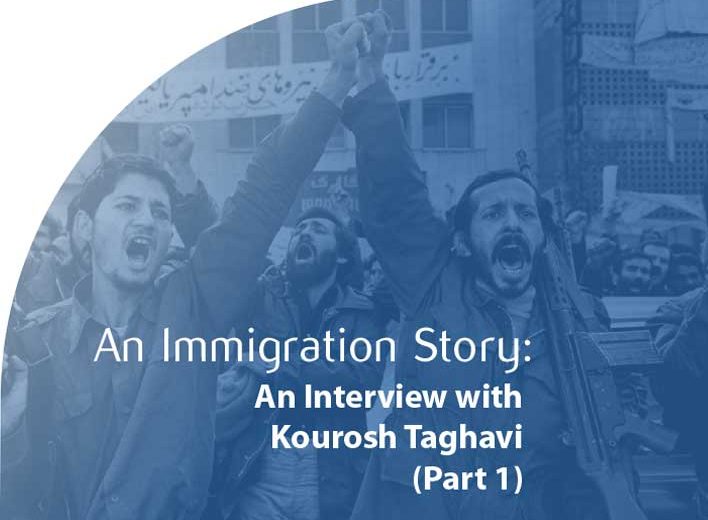












1 Comment
mansour zand September 18, 2020 at 7:28 am
. امیدوارم که غیر ایرانیهایی که حرفهای این دو ایرانی- امریکایی را میخوانند تصور نکننند که افکار و گفته های این دو نماینگر افکار بخش بزرگی از ایرانی- امریکایی ها میباشد. از یک طرف حسین خرم فرزند رحیم خرم ( میلیاردر مقاطعه کار در زمان شاه که دوست پسر ملکه مادر ۸۰ ساله و شریک حمیدرضا پهلوی) و خود وی اکنون یک بساز و بفروش عمده در شهر سیاتل . طرف دیگر این مناظره یک لابیست شرکتهای بزرگ امریکا مثل
Exxon ‘ General Mobil, , caterpillar
است.
یکی از افراطیترین افراد حزب جمهوری خواه دفاع میکند و دیگری از جناح راست حزب دموکرات که موسسات بزرگ مالی و بیمه را نمایندگی میکند. تصور نمیکنم که اکثریت ایرانیهای مقیم امریکا این دو را نماینده افکار و خواسته های خود میدانند.